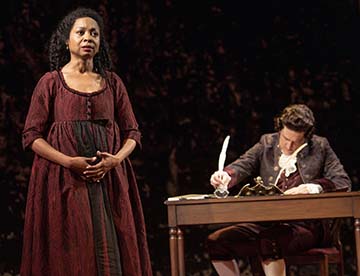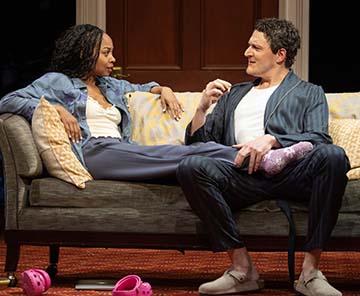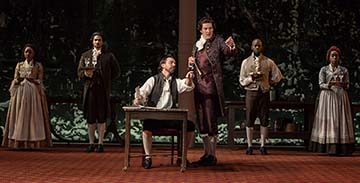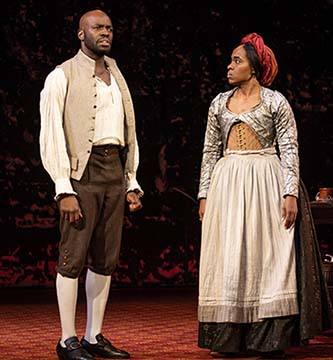
Lucy Komisar
|
“Sally & Tom” is Suzane-Lori Parks’ stunning truth about Thomas Jefferson “Sally & Tom.” The story of America has always been about the narrative, especially the righteousness of America’s foreign adventures or political leaders’ devotion to the public good. The country’s founding history is central to establishing America’s virtue. So, the narrative about Thomas Jefferson is that he was a heroic American patriot who wrote the Declaration of Independence (drum roll, “all men are created equal”) and served as the third American president.
Suzan-Lori Parks’ “Sally & Tom” subtly but brilliantly dissects the story of Jefferson and with it the founding mythology of the United States. Sally Hemings is an enslaved woman, and Thomas Jefferson is her owner. He met her when she was 14 and accompanied his daughter to to France where he was ambassador. He, 41, kept her as a concubine for 30 years and fathered their six children. He never freed her, even on his death. The play, as the best plays are, is unpredictable and full of turns, engaging with your consciousness until you realize you’ve been led to a place you didn’t know you were going. And when you get there, you wonder why you didn’t realize the truths all along. Director Steve H. Broadmax moves the action along so seamlessly that you are taken aback by the dramatic shifts.
There are two stories, one the relationship between Sally (the excellent Sheria Irving) and Tom (a fine, nuanced Gabriel Ebert), the other about Luce and Mike in a radical group putting on a play about them. The company’s actors double as the play’s characters. The actors’ dialogue and actions become commentaries on the realities of Sally and Tom. Jefferson is lauded in America as the author of the Declaration of Independence that proclaimed “that all men are created equal… with certain unalienable Rights, that among these are Life, Liberty and the pursuit of Happiness.” Were you aware that the end of the Declaration said about King George, “He has excited domestic insurrections amongst us, and has endeavoured to bring on the inhabitants of our frontiers, the merciless Indian Savages, whose known rule of warfare is an undistinguished destruction of all ages, sexes and conditions.” The king’s incitement of “domestic insurrections” refers to slave revolts. Jefferson was a racist who thought that neither native Americans nor African slaves were deserving of liberty.
So, starting with the “play” narrative, first, we meet James (a riveting Alano Miller), Tom’s enslaved valet and chef and Sally’s brother. When Tom goes to France, James accompanies him. Jefferson had 600 slaves. When he went to France, he leased slaves out to work elsewhere, tearing families apart. There was money to be made. Jefferson promised to free James. James says later he otherwise would have run away. But in France, Jefferson doesn’t free James. Or Sally. Then stop! This is a dress rehearsal of the Good Company presenting “The Pursuit of Happiness.” It’s a smart device by Parks that allows the actors to comment on the action of “the play.” Tom is taking another trip, this time to New York for the Congress. He says the slaves again will be scattered, to make a profit. Subtly sneaking up is the most powerful part of “the play.” Kwame, a Hollywood actor who used to be in the company and plays James, has been given a speech that the money-man producer Teddy, who we never see, doesn’t like. Our curiosity is piqued. Kwame will quit when the speech is banned, but “James” eventually gives it. It is the most important part of the play. James talks about hearing Thomas Payne in Paris talk about the rights of man. “My rights.” And to Jefferson, “The words you write are all lies.” James declares, “I stand with all Enslaved People who rise up and revolt! I say “Yes” to The Revolutions that explode and that will continue to explode all over this country. I condemn the “breeding farms” not more than a day’s ride from here. I acknowledge all the Horrors and the Revolutions that you dare not think on, and that we dare not speak of in your presence.
“What would we do if we were to wake up out of our “tranquility”? The wrongs done upon us would be avenged. And the world order would be upended! Yes, this is what it has come to, Mr. Jefferson! And may History lay the blame for it all at your feet!” He predicts, “A reckoning is coming and the likes of you will be crushed by the likes of me!” And perhaps talking to Americans today, he says, “You will be ashamed that you were proud to father a country where some are free and others are enslaved! Where some have plenty and others only have the dream of plenty! All them pretty words you write, Mr. Jefferson, they’re all lies! “You’ll soon be ashamed by the lies that this country was built on, Mr. Jefferson! Ashamed by the lies on which we were founded, and on which we were fed, and on which we grew fat!” Those lines in “the play” are the truths the author presents to the audience. Truths about the American hero Jefferson which are still not told to the public. Will the play company cut it? Has the revolution has been “gentrified”?
The Hemings-Jefferson issue that has gotten public attention is was there love between Sally and Tom? Doesn’t love mean a choice? Could she leave? Or was she groomed and raped? And if there was love, why didn’t Jefferson free her on his death? That would be the answer. Among the characters who debate these issues are Maggie (Kristolyn Lloyd), a black nationalist who plays the slave Mary, and actor Devon (Leland Fowler) who plays Mary’s husband Nathan and takes over the role of James. Daniel Petzold portrays a collection of whites, including a nasty slave owner and Jefferson’s scribe, both part of the same system. Which maybe is the point. Parker’s story is rich and complex. At one point Sun Mee Chomet, as Scout, a Korean actor who is a Jefferson daughter in “the play,” wonders what role a Korean would have in the slavery story. It’s not the only question that is raised. This important work is part of the American narrative. Visit Lucy’s website http://thekomisarscoop.com/ |
| museums | NYTW mail | recordings | coupons | publications | classified |





